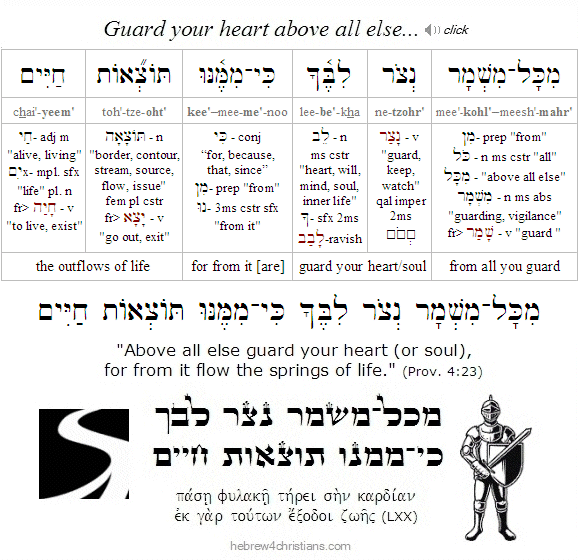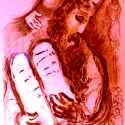|
Our Torah portion for this week, parashat Shoftim, begins: "Judges and officers you shall give to yourself (תִּתֶּן־לְךָ) in all your gates" (Deut. 16:18). In this connection some of the sages interpreted the word "gates" (שׁערים) to refer to our sense organs, for example, the "eye gate," the "ear gate," and so on. Likewise the Lord instructs us to write the words of Torah "upon the doors of our house and on our gates" (Deut. 6:9). Because we are naturally inclined to "spy after our hearts and eyes" (Num. 15:39), we are instructed to appoint "gatekeepers" to protect the sanctity of our heart and soul, as it says: "Above all else guard your heart, for from it flow the springs of life" (Prov. 4:23).
מִכָּל־מִשְׁמָר נְצר לִבֶּךָ
כִּי־מִמֶּנּוּ תּוֹצְאוֹת חַיִּים
mee·kohl - meesh·mahr · ne·tzohr · lee·be'·kha
kee-mee·me'·noo · toh·tze·oht · chai'·yeem

"Above all else guard your heart,
for from it flow the springs of life"
(Prov. 4:23)


The Hebrew text for this verse is emphatic. We are to guard our hearts vigilantly, just as a prison guard or warden might keep watch over a prisoner. The phrase translated "above all else" literally means "more than anything that might be guarded" (mikkol mishmar), a construction used to intensify the command to exercise vigilance. Plainly put, this verse commands us to watch over our heart more than anything else.
And yet "the whole head is sick, and the whole heart faint" (Isa. 1:5). We understand how apt we are to go astray in our affections, and therefore the heart is easily divided, obstructed, and liable to failure... Despite its frailty, however, the heart determines totze'ot chayim, or the "springs" or "contours" of life. In the Tanakh, the word totza'ot is often used to refer to the borders of territories or the boundaries of a city. This verse is saying that from the heart of a person (lev) a "map" or "chart" to life is drawn. As the heart is either pure or corrupt, so will be the course of one's life... Purity of heart represents healing, which means being single-minded in our affections and attention before the LORD.
How you choose to guard your heart from inner corruption and hardness will determine the "road" of your life. Concerning this verse the Metzudos commentary says, "Above all – more than anything else – a person must be careful to guard his heart from improper thoughts, for one cannot contemplate using the heart – the very vortex of life – to harbor thoughts that are inimical to life." Because the flesh is weak, we must be vigilant lest we become cynical, weary, and unfeelingly selfish. An unguarded heart soon becomes troubled, lonely, suspicious, and unstable. If, however, we keep ourselves from the obstruction of sin, we will experience the free flow of compassion, encouragement, and joy. The faithful heart is open - it believes all things, hopes all things, and endures all things (1 Cor. 13:7).
"Judges and officers you shall give to yourself (תִּתֶּן־לְךָ) in all your gates." Note that that Torah states that you shall appoint these to yourself, stated in the singular, not in the plural, to suggest that it is your personal responsibility to guard your heart from negative influences. God considers it your duty to yield yourself as a vessel or "steward" of the kingdom of God (Rom. 6:13). We must regularly ask God to enlighten "the eyes of the heart" according to His wisdom and power (i.e., truth revealed in Scripture), and to impart the power of the Holy Spirit to transform our desires and affections so that they conform to the character of the Messiah.
|




